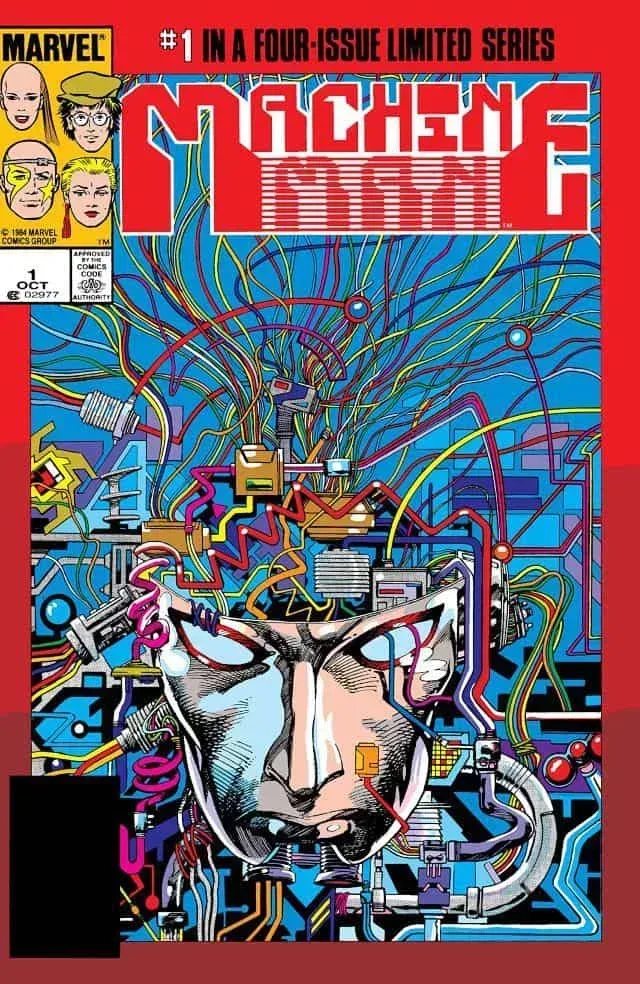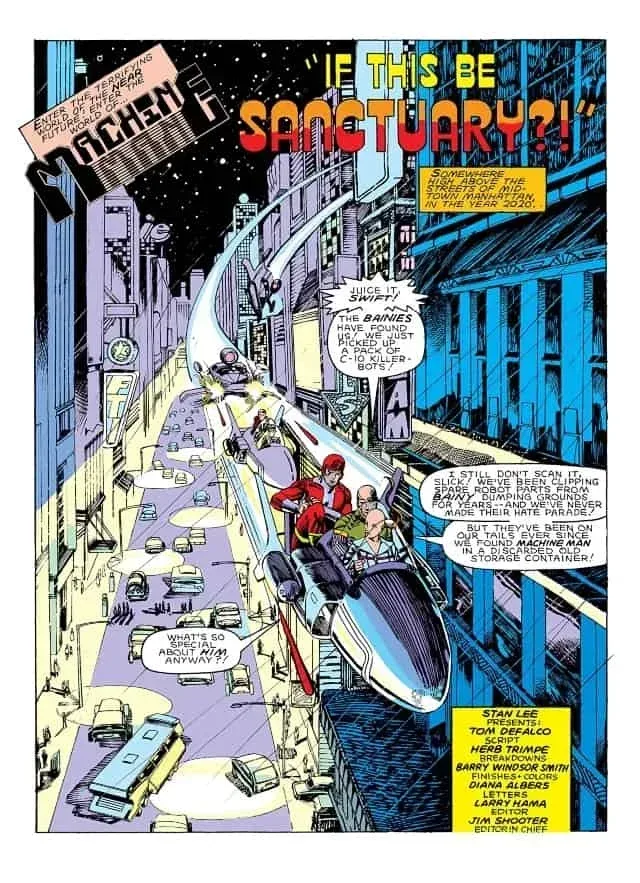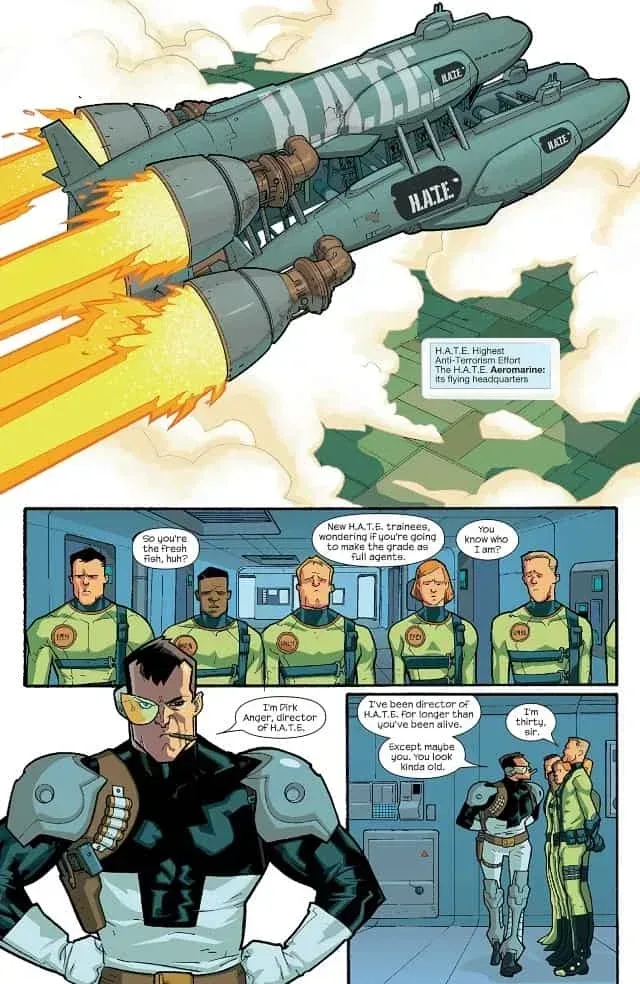
In July 1977, Marvel Comics published its 2001: A Space Odyssey #8, written and illustrated by the legendary Jack Kirby. Although this sci-fi comic book is famous for being an adaptation based on Arthur C. Clarke’s classic sci-fi novel of the same name, this issue is even more important because it introduced us to the character of Machine Man, who is going to be the topic of today’s article.
Machine Man itself was the basis for the Nextwave series, which was a humorous comic book series that was in several aspects ahead of its time and is still lauded by critics around the world.
In today’s article, I am going to talk about the legacy of the Machine Man comic book series that debuted in 1978 and had a total of three volumes, with the latter two being published in the 1980s and the 1990s. I am going to tell you about the history of the Machine Man comic book, its historical importance, and how it ties into the Nextwave series, as well as about the things the series has predicted. Enjoy!
When was Machine Man released?
As you know by now, Machine Man debuted in 2001: A Space Odyssey #8 (1977). When Jack Kirby created him, he was initially called Mister Machine and was a part of the Odyssey adaptation. But, it wasn’t too long before Marvel launched a standalone series titled Machine Man, which debuted in 1978, with Kirby writing the first nine issues.
Machine Man volume 1 showed the titular character entering the mainstream Marvel Universe, which also allowed him to appear in other (mainstream) titles. The first volume had a total of 19 issues and ended in February 1980.
The second volume of the Machine Man comic book series appeared in October 1984 with a new creative team behind it. The series was exceptionally popular and even had cyberpunk elements, but was discontinued after just four issues, in January 1985.
Machine Man was “revived” in the X-51 series and in 1999, he got his third standalone series titled The Machine Man. He was drastically revised compared to his earlier iterations and was part of the mainstream universe.
Now that you know how the story of Machine Man developed, I can continue with the cultural impact of that comic book.

Was Machine Man ahead of its time?
Although Machine Man was a relatively popular title for the time and it has somewhat cult status today, Machine Man’s biggest contribution to Marvel’s comic book slate is that it opened the way for the Nextwave series, which became one of Marvel’s most unique titles.
Machine Man itself was a series that didn’t really have an immediate impact, as Kirby wrote his stories in his usual fashion, which was great, but revolutionary in any way. Still, as the story developed, Machine Man’s universe evolved and it eventually opened the way for a completely different brand of superheroes – the Nextwave group.
Nextwave debuted in 2006, roughly thirty years after Machine Man, but its initial 12-issue run shook the foundations of Marvel’s mainstream universe, so much, in fact, that Marvel had to write them out of the main continuity afterward. Nextwave was a very shocking title and the whole group was something Marvel had never published before, so the discontinuation (in a way) was actually a form of damage control for the publishing house.
The interesting thing is that characters from Nexwtave had prior and later appearances in Marvel’s mainstream universe, which made the decision, or rather, the statement from Joe Quesada even stranger:
“For the time being, Nextwave is considered to be a separate universe much in the same way the Ultimate titles are. Quesada didn’t rule out Ellis bringing in guest stars from the Marvel Universe like Spider-Man.” (Source)
This happened back in 2006, but recent publications by Marvel Comics suggested that Quesada’s statement had since been revoked and that the Nextwave group is, in fact, considered to be a part of Marvel’s mainstream narrative continuity.

Why was Nextwave ahead of its time?
In this final section, I am going to list the reasons for which the Nextwave series was ahead of its time and one of the more interesting stories published by Marvel:
- Although #11 contained the words “Civil War?” and was published at the same time as Marvel’s Civil War crossover event, the authors decided to mock the crossover itself and used the same print and design as the main Civil War narrative, but without interfering in the continuity at all. Nextwave was so individual that it defied crossovers in every possible way.
- It inspired the soundtrack for a comic book by Nick and Matt Lowe, which was a revolutionary thing for comic books, although Nextwave wasn’t the first one to do it.
- Warren Ellis’ run-and-gun, dedicated approach to his 12-issue story, after which the series ended completely, was used by Marvel in other storylines and a short, author-run narrative, after which a story ends has become an industry standard thanks to Nextwave.
- Nextwave predicted coloring books for adults, which became very popular not long after the series’ publication.
- Nextwave also reinvented the recap page, a long-lasting tradition of mainstream comic book titles, giving it a different perspective and design.
- The Nextwave group consisted of old characters “collected” from other stories, which means that the authors repurposed these characters for their own needs. This is something that is often done in modern-day comics.
- Nextwave did a lot to embrace comic book postmodernism, something that is happening more often in modern comic books, but Nextwave was a pioneering title in that aspect.
- In a way, Nextwave managed to perfect the comic book pastiche, allowing all future authors to build on that in later stories.
- It redefined teen-oriented comic books, becoming an instant classic and a storyline that, despite Marvel’s insistency of pushing it under the rug, was among the best of the year.
- The narrative decisions made by Ellis, including the introduction of the evil S.H.I.E.L.D. or the reinvention of the Devil Dinosaur, and even Monica Rambeau, helped shape future Marvel stories and series.

